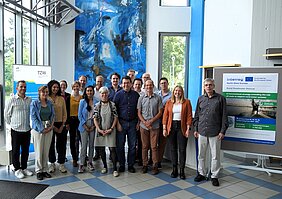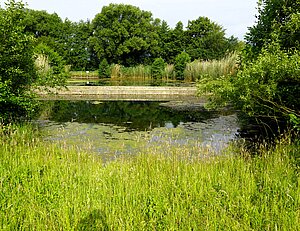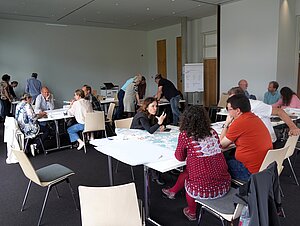This article is published on the website of TZW
From June 3 to 5 2024, one of four major project meetings took place at TZW in Karlsruhe as part of the Rural Roadwater Rescue (RRR) project funded by the EU under the Interreg North-West Europe (NWE) program. The program of the meeting included presentations, discussion rounds, workshops and excursions.

Ongoing work in the project
At the three-day live partner meeting at TZW in Karlsruhe, the project partners of the Rural Roadwater Rescue (RRR) project came together to discuss the current project status and the next steps. The aim of RRR is to identify a feasible strategy for saving, treating and distributing road runoff water locally by redesigning existing roads and highways. To this end, the project partners identified seven key elements that need to be focused on to implement that strategy:
- collection of roadwater
- cleaning / treatment (natural, semi-technical, technical)
- storage
- distribution
- use
- prevention of pollution of roadwater
- influence on ecosystem balances
Based on these elements, the partner countries will draw up an overview of the regulations currently in force in the four countries. To this end, a questionnaire was developed to find out the state of the art for techniques used in roadwater management.
Excursion to a roadwater treatment plant
Die Autobahn GmbH is also an associated partner of the RRR-project. Guido Zadel, an expert in sustainable mobility at Die Autobahn GmbH, organized an excursion to a roadwater treatment plant near Ettlingen at the highway A5 together with the Karlsruhe highway maintenance department. The road runoff water is collected directly next to the highway and freed from oils floating on the surface as well as from sedimenting particles. The treated water is stored in a sedimentation bassin and then given back to nature, either by infiltration into ground water or by introducing it to a natural water course, the decision being made by the local water authority.

Development of a larger project with practical use cases
The RRR project is intended to result in a larger project with the acronym STEREO ROADS. This is meant to enable the establishment of multifunctional roads in specific use cases. As part of a workshop on use cases in the four partner countries, the relevant issues and conflicts of interest between communities and institutions were worked out in small groups. The stakeholders are especially found in regions that have already been affected by road flooding, or had to counteract droughts in the past.

Project meeting RRR partners at TZW Karlsruhe (G)